The Ultimate Guide to Visiting Acadia National Park With Your Dog
If you’re planning a visit to Acadia National Park with your dog, you might wonder what you can do with dogs in the park. There’s some good news for you! Acadia National Park is one of the most dog-friendly national parks in America and offers a multitude of activity options.
Over a hundred miles of trails and historic carriage roads are open for hiking with dogs and other pets, while your furry friends are also welcome in most developed areas.
In this guide, you’ll find comprehensive information about visiting Acadia National Park with dogs, from the park’s official pet policy and safety tips to dog-friendly hikes and activities.
FAQ About Visiting Acadia National Park With Your Dog
Below, you’ll find all the answers to the most common questions about dog rules at Acadia National Park. This section will provide you with the necessary information to properly plan and prepare for your visit to Acadia.
At the end of these FAQs is a nice list of several fun things you can do in Acadia National Park with your dog.
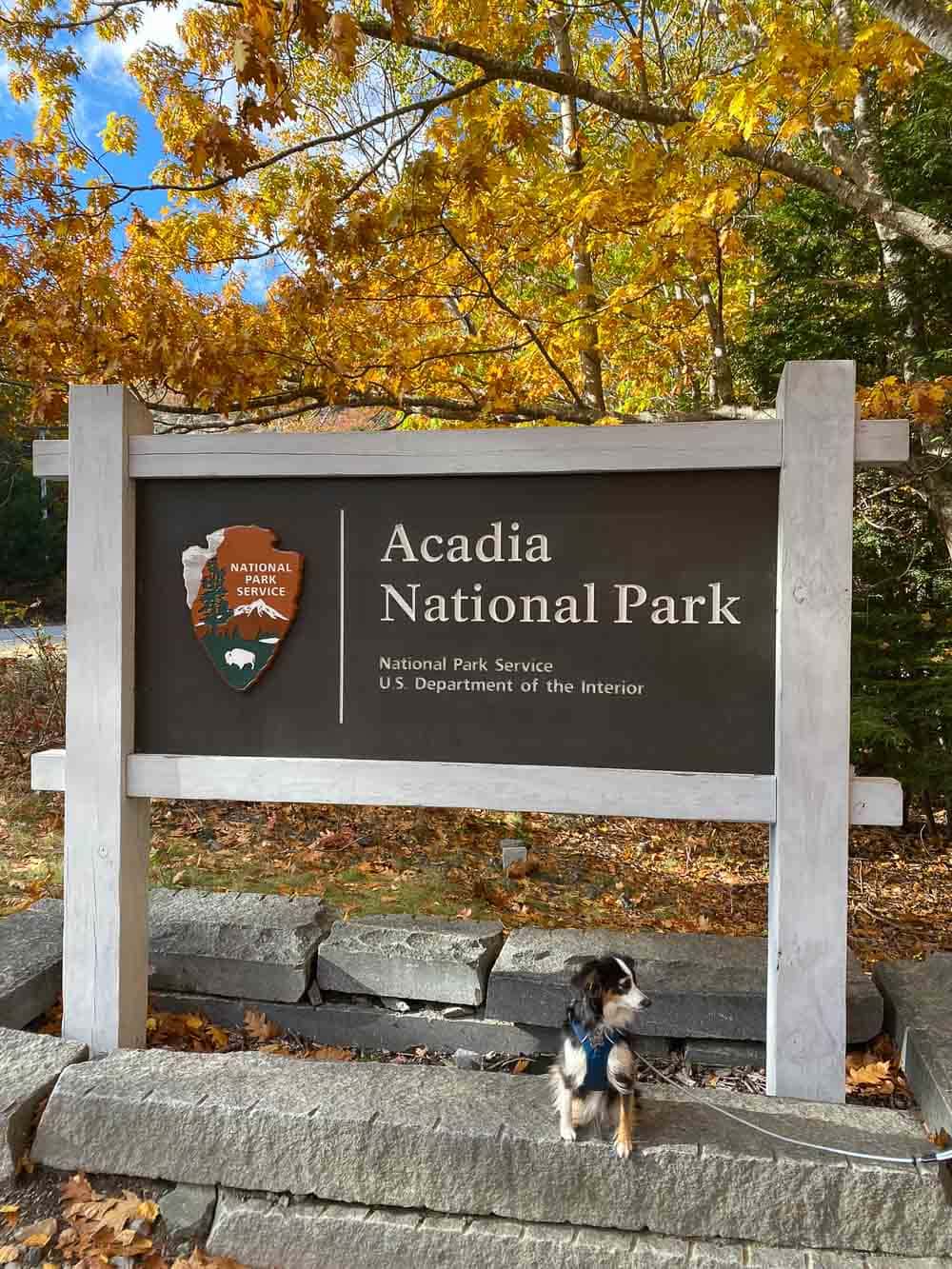
This guide to visiting Acadia National Park with your dog contains affiliate links. You can read more about our Terms of Use / Disclosure here.
Can I Bring My Dog to Acadia National Park?
The answer to the most important question of all is a resounding ‘YES’. Dogs are allowed in Acadia National Park with very limited restrictions, especially when compared to other U.S. national parks.
What Are the Rules for Dogs at Acadia National Park?
The main rule for dogs at Acadia is that they must be on a leash that’s no longer than 6 feet in length at all times (except when they’re in a vehicle). Dogs must always be under the direct control of the owner, too.
“Wildlife, including porcupines and those with infectious diseases, can harm even well-trained pets. Unleashed pets also disturb and even threaten wildlife. Please protect your pet, other visitors, and the park by keeping your pet on a leash,” the National Park Service says.
Another important rule is that dog owners are required to pick up dog waste everywhere, including in campgrounds, picnic areas, parking lots, and on roads and trails. “Pet waste can leech into groundwater and pass diseases to wildlife.”
Lastly, the National Park Service emphasizes the dangers of leaving pets in vehicles. Because of the serious threat of overheating a car, dogs should not be left in vehicles. In fact, dogs may not be left unattended anywhere in the park, including at campsites.
Learn how your dog can become a BARK ranger in Acadia National Park here.

Where Can I Go With My Dog in Acadia National Park?
Dogs are welcome at many places in Acadia National Park. This includes most hiking trails, all carriage roads, as well as three campgrounds. They’re also allowed on roads and in parking lots.
Pets are allowed in the following places in Acadia National Park:
- On all carriage roads
- On most hiking trails (see exceptions below)
- At the Blackwoods, Seawall and Schoodic Woods campgrounds
- On Isle Au Haut, only for day hiking
- In developed areas, such as roads, parking lots and picnic areas
Where Are Dogs NOT Allowed in Acadia National Park?
Even though Acadia National Park is an exceptionally dog-friendly national park, there are a number of places where they’re not permitted.
These are the places where pets are not allowed in Acadia National Park:
- On ranger-guided programs
- In public buildings, including visitor centers. (Service animals are allowed in visitor centers, though.)
- In the Wild Gardens of Acadia (Sieur de Monts)
- At the Duck Harbor Campground
- In most lakes (many lakes in Acadia are public water supplies)
- On Sand Beach (not permitted June 15 – September 8)
- At Echo Lake Beach (not permitted May 15 – September 15)
- On the six cliff ladder trails, Beehive, Beech Cliffs, Ladder Trail to Dorr Mountain, Perpendicular, Precipice, and Jordan Cliffs between Penobscot East and the carriage road
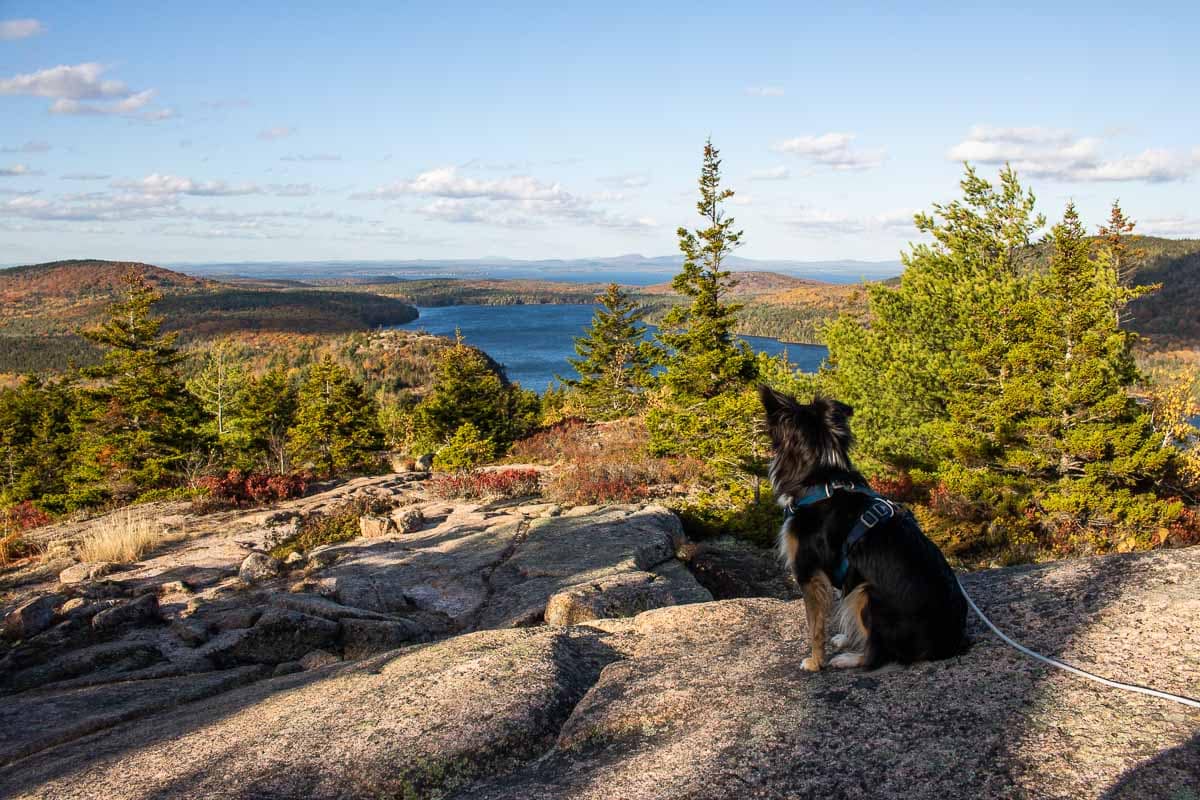
Can I Go Hiking at Acadia With My Dog?
Acadia National Park’s status as one of the best national parks to visit with dogs is due to its numerous pet-friendly hiking trails. In fact, there are no fewer than 100 miles of hiking trails and an additional 45 miles of carriage roads where dogs and other pets are allowed.
As noted above, there are six trails where dogs aren’t allowed in Acadia. Those are the trails with ladders, steep cliffs and iron rungs.
Some other trails may not be appropriate for pets, but this is up to the discretion of the pet’s owners. Trails that might be too steep or challenging for (certain) dogs include Acadia Mountain, Flying Mountain, the West Face of Cadillac Mountain, Bubbles-Pemetic, and Penobscot Mountain (Spring). See the full list here.
That said, however, with 145 miles of trails and carriage roads to explore, there’s a plethora of opportunities to explore Acadia National Park with dogs.
Some recommended dog-friendly hikes in Acadia National Park include the following:
- Gorham Mountain Loop (3.5-mile loop featuring a mountain summit, panoramic views and rocky coastline)
- Ocean Path (4.4-mile out-and-back hike along the spectacular coastline of southeastern Mount Desert Island)
- Bar Island Trail (1.9 out-and-back hike to the top of Bar Island in Bar Harbor, only accessible at low tide)
- Cadillac Mountain South Ridge Trail (7.1-mile out-and-back hike to the summit of Acadia’s highest mountain, providing excellent views)
- Jordan Pond Path (3.3-mile loop around scenic Jordan Pond)
- Pemetic Mountain South Ridge Trail (4-mile out-and-back hike to the summit of Pemetic Mountain, great views of Cadillac Mountain, Jordan Pond and the coast)
- Bubbles Nubble Loop (2.6-mile loop to the top of the Bubbles and Connors Nubble; some sections are pretty steep and may require picking up your dog)
- All carriage roads (these wide gravel roads are amazing for hikes with dogs)
Can I Leave My Dog in My Car When Exploring Acadia National Park?
No! Please never leave your dog alone in the car when exploring a national park. Overheating in a car is a very real danger, even on cooler sunny days.
Acadia National Park pet rules state that dogs may never be left unattended anywhere, which includes vehicles and campsites.
What Can I Do With My Dog in Acadia National Park?
The information about pets in Acadia above should allow you to figure out what to do in Acadia National Park with your dog. But to simplify your planning process even more, I’ve written down a selection of a handful of super-fun things you can do with dogs at Acadia.
There are numerous memorable experiences you can share with your dog in this beautiful national park. From beach fun to easy walks and long hikes, check out my favorite dog-friendly activities in Acadia below!
1. Explore the Carriage Roads Network
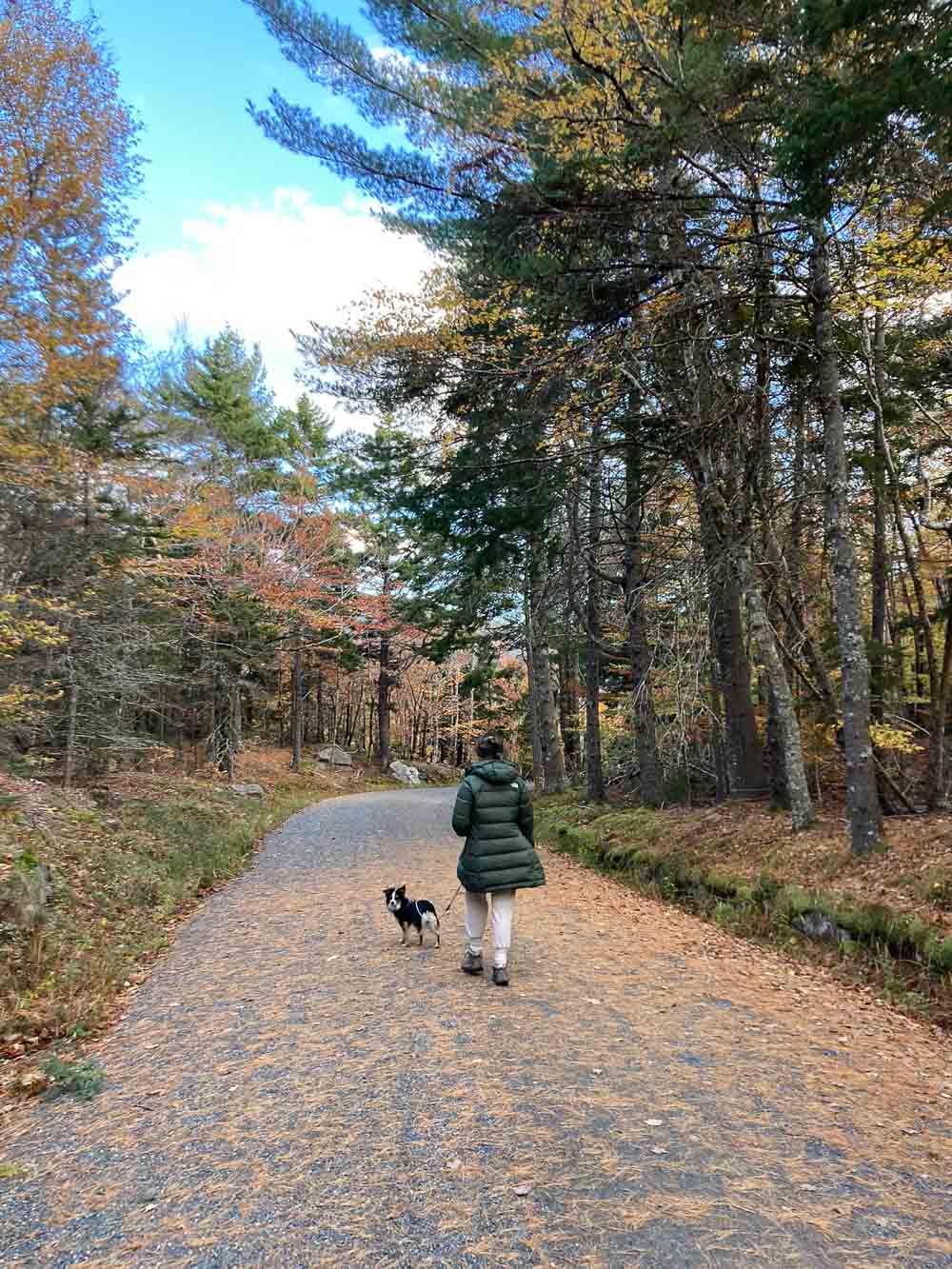
Forty-five miles of carriage roads crisscross the forests, slopes and ocean shores of Acadia National Park. This dense and interconnected network of unpaved roads provides endless walking opportunities. All carriage roads are open to pets.
Popular walks on Acadia’s carriage roads include the following:
- Hulls Cove to Paradise Hill, Witch Hole Pond and Duck Brook Bridge (4.7 miles, loop)
- Day Mountain Loop (5.3 miles, loop)
- Jordan Pond to the Stanley Brook, Cobblestone and Jordan Pond Bridges (3.1 miles, loop)
- Eagle Lake Loop (5.9 miles, loop)
- Hadlock Loop (4.2 miles, loop)
Remember that these historic carriage roads are also open to other hikers and bicyclists, and some to horseback riders.
Check out the park’s carriage roads map here for more walking options.
2. Play at Sand Beach (in the Off Season)
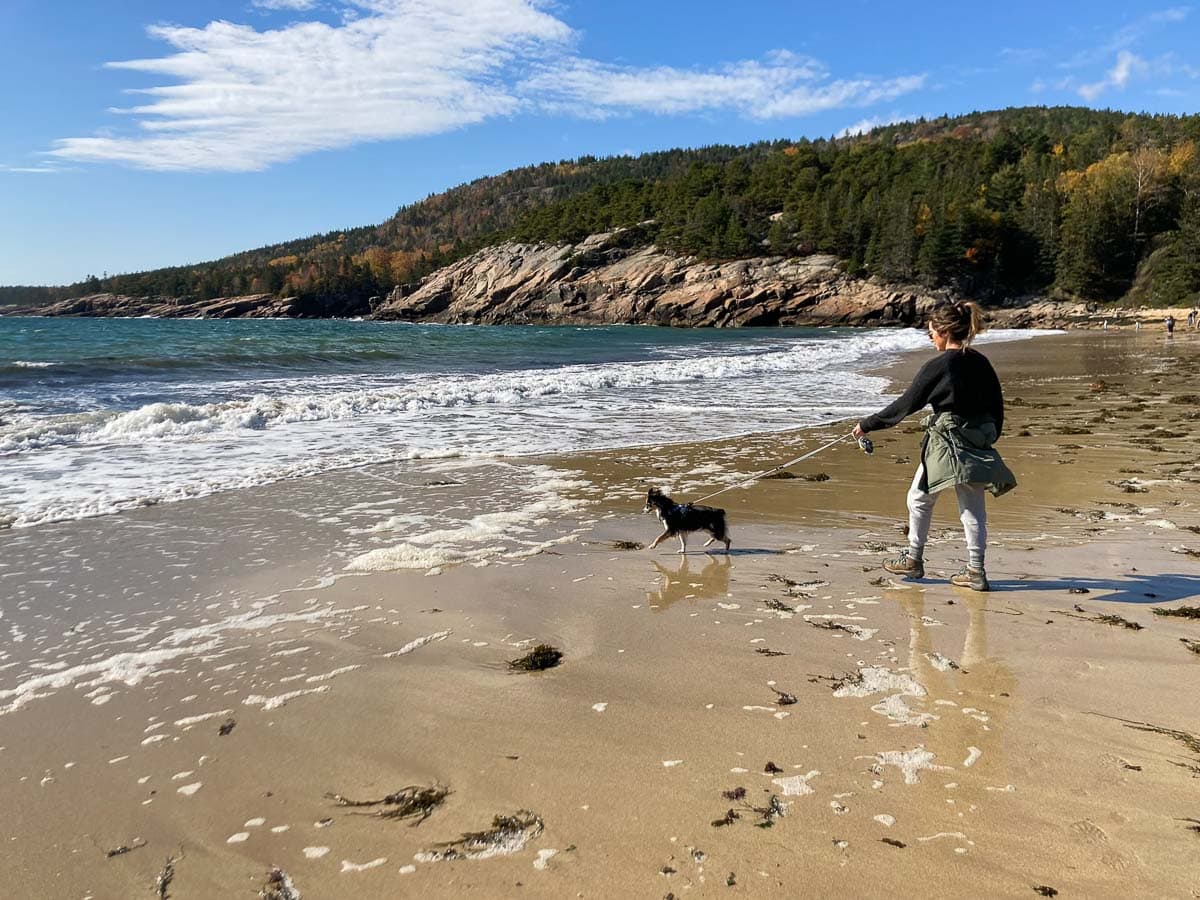
Sand Beach, situated on the east coast of Mount Desert Island, is one of two beaches in Acadia National Park where swimming is allowed in summer. Therefore, pets are not permitted there in the busy summer season.
In the off season, however, you can enjoy this beautiful Atlantic Ocean beach with your dog! From mid-September to mid-June, Sand Beach is open to visitors and their pets. Again, pets must be on a leash at all times.
Stroll across the beach, walk the Great Head Trail or start your coastal hike to Otter Point (see below).
3. Enjoy the Sea Breeze on the Ocean Path
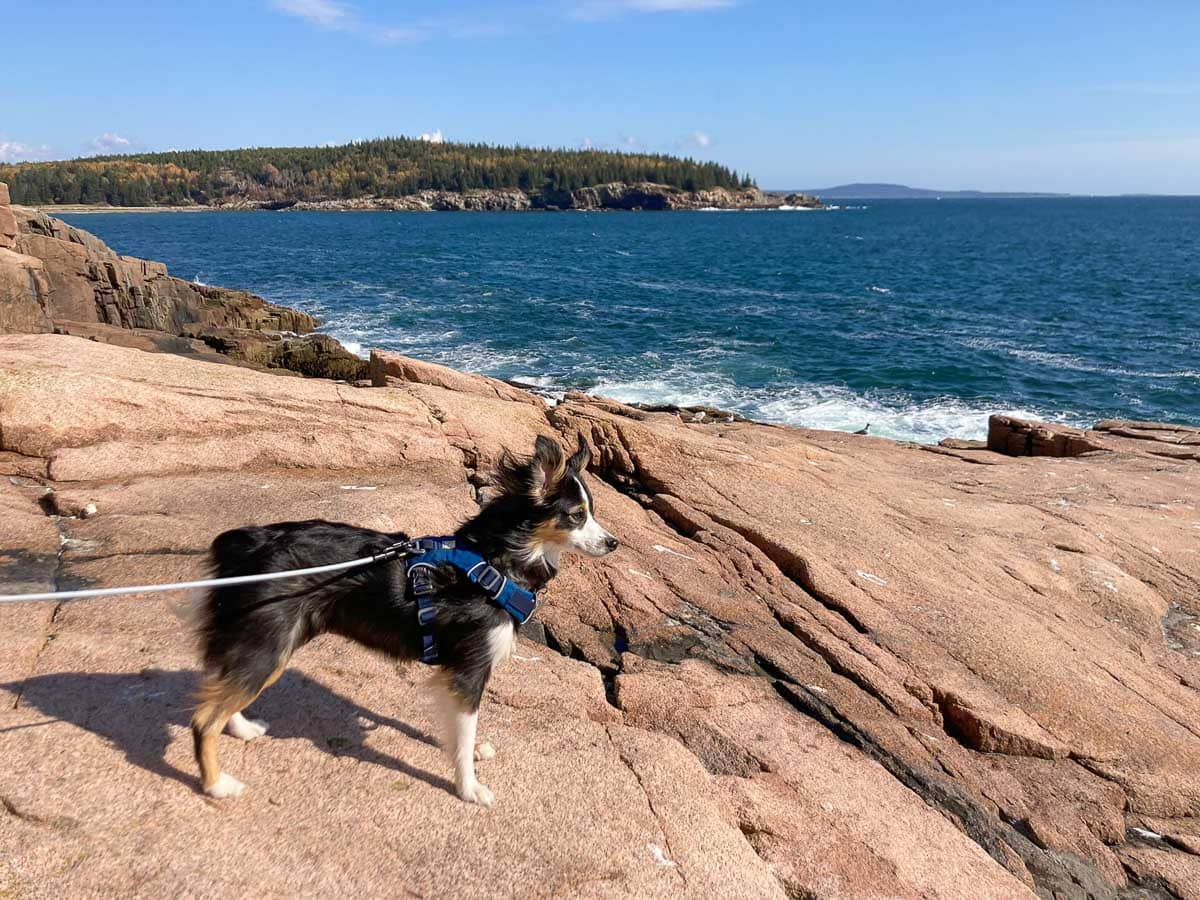
The wonderful Ocean Path is an easy 2.2-mile one-way trail from Sand Beach to Otter Point. It parallels the coastal section of the Park Loop Road, offering amazing ocean views, access to other trails, and a great dog walking experience.
This is one of the park’s busiest areas, though, so keep your pet close (on a 6-foot leash) and arrive early to find a parking spot. Attractions along the way include Thunder Hole, Otter Cliffs and Sand Beach.
If you can, I recommend walking this gorgeous trail at sunrise, which can be enjoyed from various spots along Ocean Path.
4. Walk the Jesup Path and Hemlock Path Loop
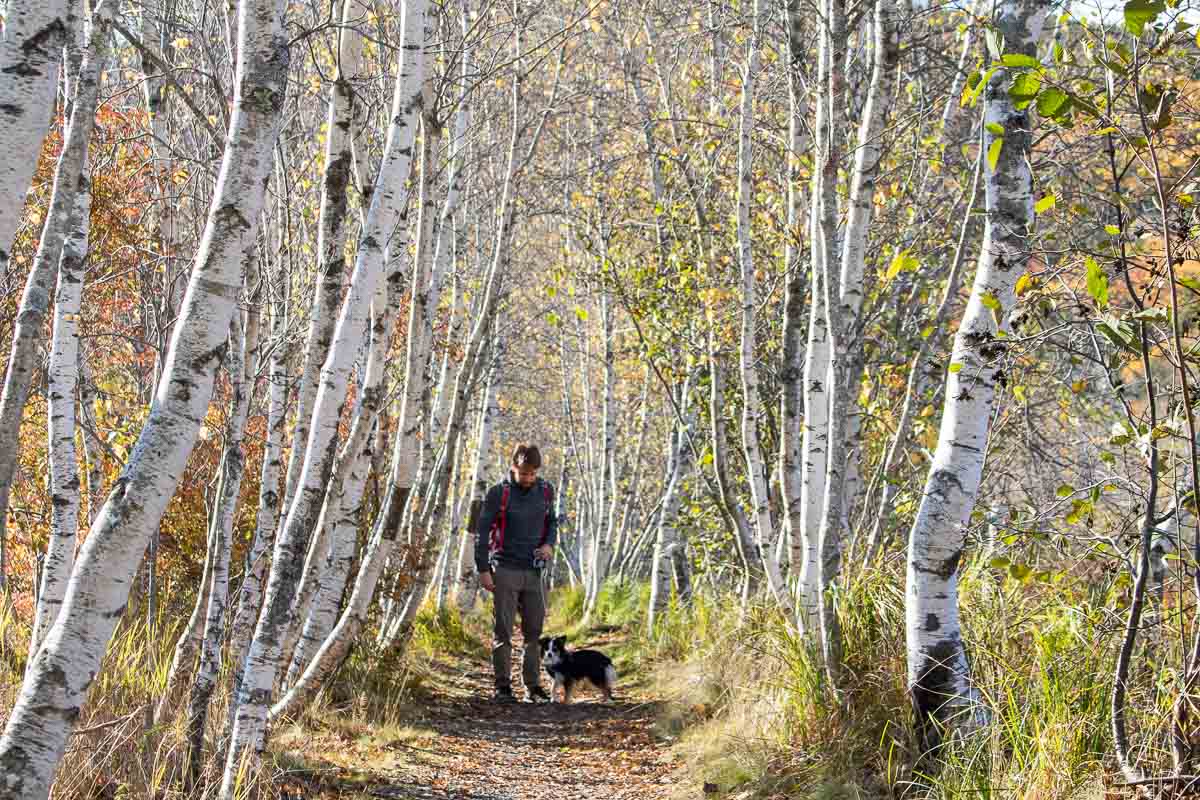
Two mainly level trails make up the figure-8-shaped Jesup Path and Hemlock Path Loop. This easy loop is perhaps one of the most underrated dog-friendly hikes in Acadia National Park.
Running through stands of hemlock and white birch, the trails run from Sieur de Monts to the Great Meadow.
It’s a combination of gravel trails and boardwalk, a 1.5-mile roundtrip hike. Interpretive panels and benches provide more information and a place to take in the beautiful scenery.
The Jesup Path and Hemlock Path Loop is particularly amazing in the fall, usually mid-October, when the birch leaves are a vibrant yellow.
5. Hike Around Jordan Pond

Jordan Pond is one of Acadia National Park’s most iconic places. This gorgeous lake sits in a steep valley that was carved out by retreating glaciers, surrounded by Pemetic Mountain, Penobscot Mountain and the famous Bubbles.
The Jordan Pond Path runs around the entire lake, a 3.3-mile loop lined with wonderful views and opportunities to see wildlife like beavers and common loons.
This is a pretty easy hike in Acadia National Park, a combination of boardwalks and gravel trails. It’s great for families with children and pets.
6. Visit Bar Island During Low Tide
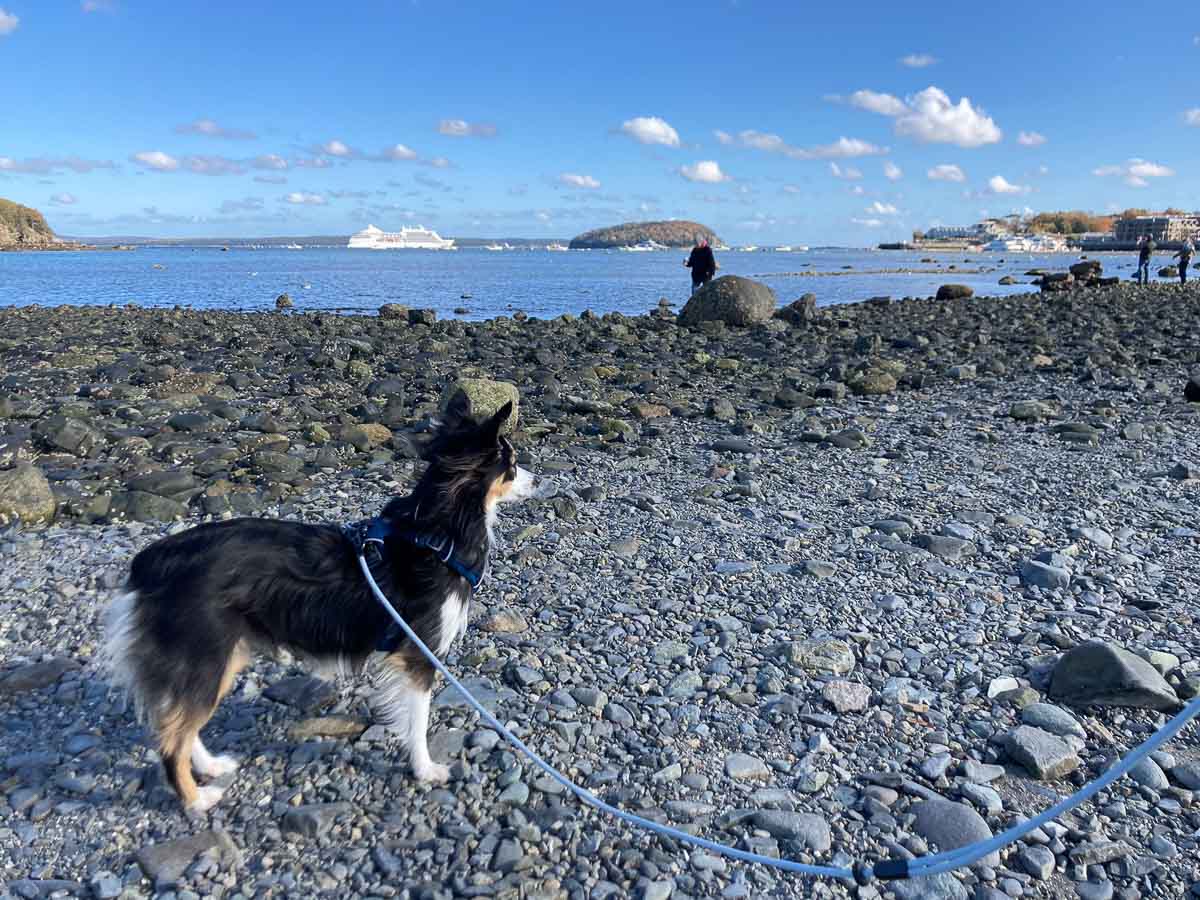
If you’re not camping within the park, chances are you’ll be staying in Bar Harbor when visiting Acadia. One of the most fun things to do in town is walking the gravel bar to Bar Island at low tide.
This is a great thing to do with dogs in Acadia National Park (Bar Island is part of the national park). The gravel bar between Bar Harbor and Bar Island is exposed for 1.5 hours before and after low tide, allowing you to walk over to the island and up to its highest point.
The gravel bar and trail to the island’s summit is a 1.9-mile roundtrip hike. People enjoy the beautiful seaside scenery, while dogs relish the opportunity to explore tide pools and sniff the sea breeze.
Check the tide chart for Bar Harbor here.
7. Hike to Pemetic Mountain Summit via the South Ridge

The hike to the summit of Pemetic Mountain is a fun adventure to have with your dog. Pets are allowed on the Pemetic South Ridge Trail, which starts at the Jordan Pond North Parking.
It’s a fairly gradual 2-mile ascent to the summit with some steeper sections, a 4-mile roundtrip hike. After the initial section through the forest, the trail opens up onto an exposed granite ridge.
From the tree line to the top, you and your dog can enjoy truly jaw-dropping views in virtually every direction.
Many major landmarks are visible, including Jordan Pond, Cadillac Mountain, Eagle Lake and the spectacular coast of Maine.

Safety Tips to Visit Acadia National Park With Dogs
Enjoying Acadia with your dog is generally a pretty safe experience. However, there are a couple of things you should keep in mind to ensure an enjoyable visit to the park.
First of all, know where you can go, where dogs are allowed in the park and how to behave when encountering wildlife.
Wildlife
Acadia National Park is home to many wild animals, which is why dogs must always be on a leash. The wildlife you’re most likely to see includes deer, beavers, various birds, porcupines, turtles and porpoises.
Unpleasant physical encounters between dogs and porcupines have occurred in Acadia National Park, so be aware of them when hiking.
Black bears are also present in the park, but are rarely seen, let alone encountered. Still, it’s important to know what to do when encountering a black bear. Contrary to popular belief, moose are essentially never seen on Mount Desert Island.
The one animal you should be aware of is one of the tiniest ones—ticks.
Ticks are most active from late-spring to early-fall in Acadia National Park. To limit your exposure to these tiny creatures and the diseases they might carry, the National Park Service offers the following advice:
- Walk in the middle of trails away from tall vegetation
- Wear light-colored clothing so ticks are easier to spot
- Wear pants tucked into socks
- Spray your shoes and clothing with repellent
- Check yourself carefully after walks
Poison Ivy
When hiking the plethora of dog-friendly trails in Acadia National Park, or exploring the carriage roads, you should watch out for poison ivy. This native plant is found throughout the national park and along trails.
You can identify poison ivy by its three jagged and shiny leaves—“leaves of three, let it be”. More information about poison ivy can be found here.
More About Acadia National Park
- Park Website
- Travel Guide
- Topographic Map
- Best Acadia Hikes
- Top Things To Do in Acadia National Park
- Where to See Fall Colors in Acadia National Park
- Viewpoints
- Accommodation






